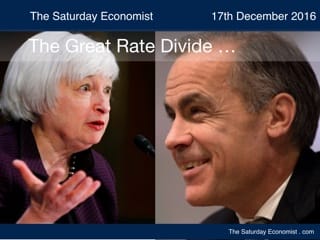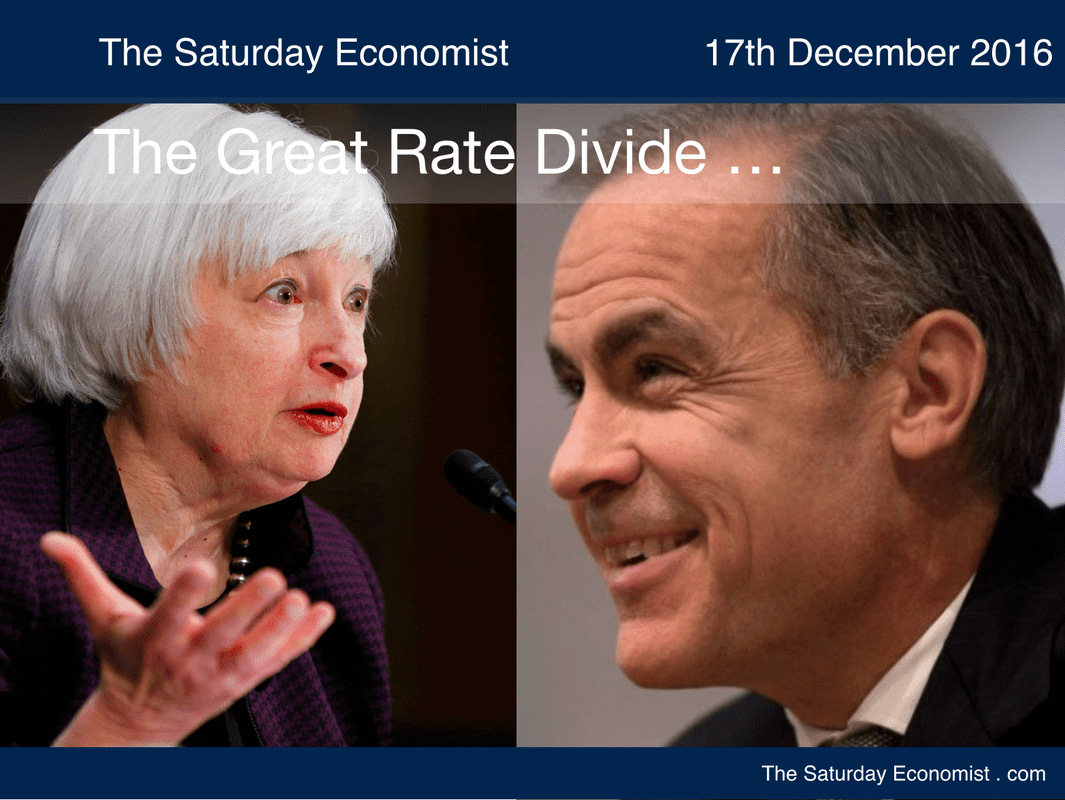 The Fed moved to hike rates this week. Growth in the economy, a strong jobs market and a moderate rise in inflation, prompted the move. "In view of realized and expected labor market conditions and inflation, the Committee decided to raise the target range for the federal funds rate to 1/2 to 3/4 percent." The stance of monetary policy remains accommodating, supporting a further rise in employment and inflation. Not so accommodating, by the end of 2017, the fed funds rate is expected to be 1.4% with a further three moderate rate rises expected over the next twelve months. In the U.K. the MPC voted unanimously to keep U.K. rates on hold. The level of government bond investment was held at £435 billion. The £10 billion corporate bond adventure was also maintained. So what is going on? This week, the ONS announced retail sales up 6% in November, unemployment down to 4.8% in October and inflation jumping to 1.2% in the latest month available. The CBI industrial trends survey, reported strong data from the manufacturing sector and the Bank of England's own survey of household perceptions confirmed spending plans remained unaffected by the referendum decision. Janet Yellen admitted the FOMC is behind the curve in escalating rates. If the FOMC is behind the curve, the MPC must be beyond the bend. The Bank of England is fretting about a post Brexit condition which doesn't exist as yet. The agreement to leave, may take ten years to determine, according to Sir Ivan Rogers, the U.K.'s permanent representative in the EU. U.K. Growth in 2016 will be over 2%. We see no reason why a similar level will not be achieved in 2017. U.K inflation is set to bounce well above target in the first quarter of 2017. The correlation between U.S and U.K rates is high [0.8442]. Our guidance is "Watch the Fed and add three months". The MPC should make the move to "normalise" rates, reversing the premature and misguided decision to cut rates earlier this year. Retail sales boom continues ... Retail sales were up by 5.9% in November. Online sales were up by almost 25%, accounting for 16% of all retail [non fuel] activity. We expect online sales to account for one in five transactions within the next five years. Multi channel, the key to survival in the world of "surf and turf". The return of inflation is evident within the retail data. In the first quarter of the year, retail sales volumes were up by over 4% but values increased by just over 1%. By the final quarter of the year, the disparity will have disappeared. Retail sales were up by 5.9% in volume and 5.9% in value. Retailers love inflation, albeit gently at first. Inflation CPI basis jumped to 1.2% in November up from 0.9% prior month. Service sector inflation increased by 2.2% and goods inflation increased by just 0.2%. Evidence of inflation yet to come is presented in producer prices. Output prices increased by 2.3% and input prices increased by almost 13%. Import prices are affected by the depreciation of Sterling. Fuel costs are exacerbated by the rise in oil prices. Brent crude closed over $55 dollars this week. Sterling closed at $1.249. The year on year increase, Sterling based was almost 30% in November. In December the increase will be over 70%. In January and February fuel costs Sterling based will double, up by 100%! Jobs market ... strong growth continues ... The unemployment rate was 4.8% in October. 1.6 million were unemployed compared to 1.7 million in the same period last year. A total of 31.8 million were in work, up by 342,000 over the year. The claimant count rate was unchanged at 2.3% in November. The actual number increased slightly to 809,000. The number of vacancies fell to 748,000. That's still almost one vacancy for everyone on the claimant count register. Earnings increased to 2.8% in the latest month for October. Private sector pay increased to 3.1%. Leisure sector earnings increased by over 4%. Construction pay jumped to 8.6%. Wage inflation is set to accelerate in 2017 as the U.K. copes with full employment and a strong economy. Inflation CPI basis will increase to 3% to 4% in the first quarter as import costs are impacted by the weakness of Sterling. An inflation hike just in time for the pay round? It really is time to follow the Fed and make the move to leave Planet ZIRP. We expect the first rate rise in March next year ... So what happened to Markets? Markets, were up - the Dow closed at 19,828 from 19,690. The FTSE closed at 7,011 from 6,954. Sterling was down against the Dollar to $1.249 from $1.257 and up against the Euro to €1.195 from €1.193. The Euro moved down against the Dollar at 1.044 from 1.054. Oil Price Brent Crude closed at $55.19 from $54.20 The average price in December last year was $38.53. UK Gilts - yields moved up. UK Ten year gilt yields closed at 1.45 from 1.44. US Treasury yields moved to 2.60 from 2.42. Gold closed at $1,137 from $1,1575. John That's all for this week ... This will be the last Saturday Economist edition for 2016. I would like to wish everyone a Merry Christmas and a Happy New Year. We will be back on the 7th January 2017 entering our sixth year of updates. As always your support and comments are much appreciated. © 2016 John Ashcroft, Economics, Strategy and Social Media, experience worth sharing. ______________________________________________________________________________________________________________ The material is based upon information which we consider to be reliable but we do not represent that it is accurate or complete and it should not be relied upon as such. We accept no liability for errors, or omissions of opinion or fact. In particular, no reliance should be placed on the comments on trends in financial markets. The receipt of this email should not be construed as the giving of advice relating to finance or investment.. _________________________________________________________________________________________
0 Comments
Leave a Reply. |
The Saturday EconomistAuthorJohn Ashcroft publishes the Saturday Economist. Join the mailing list for updates on the UK and World Economy. Archives
July 2024
Categories
All
|
| The Saturday Economist |
The material is based upon information which we consider to be reliable but we do not represent that it is accurate or complete and it should not be relied upon as such. We accept no liability for errors, or omissions of opinion or fact. In particular, no reliance should be placed on the comments on trends in financial markets. The presentation should not be construed as the giving of investment advice.
|
The Saturday Economist, weekly updates on the UK economy.
Sign Up Now! Stay Up To Date! | Privacy Policy | Terms and Conditions | |

 RSS Feed
RSS Feed